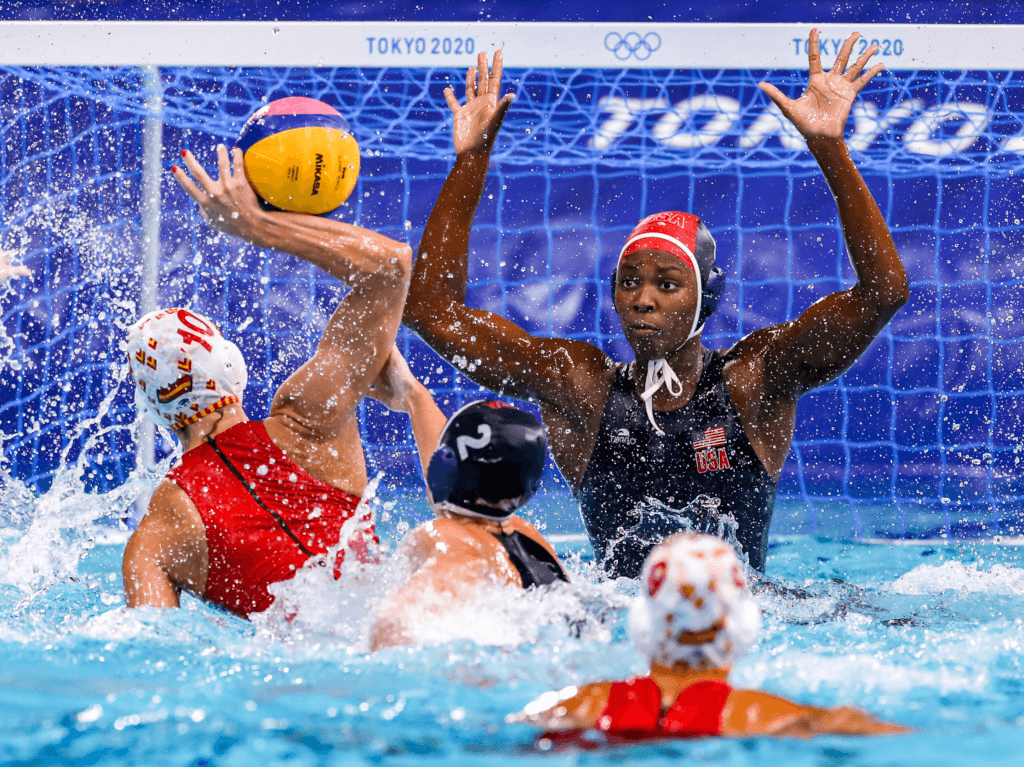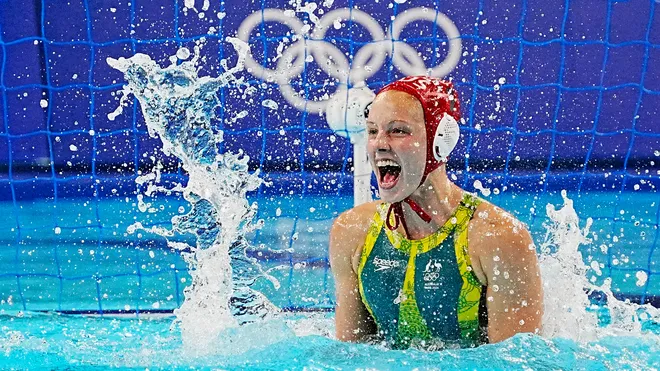A Painful Defeat in Paris
The U.S. women’s water polo team faced a heartbreaking defeat on Thursday during the Paris Olympics, losing a grueling semifinal match to Australia in a penalty shootout. The match ended 14-13 in favor of the Australians, a rare and painful loss for a team accustomed to standing atop the Olympic podium. For Maddie Musselman, a two-time Olympic champion, the defeat was especially tough, marking the first time she had failed to reach the final in her Olympic career.
However, Musselman, who has endured significant personal struggles off the field, quickly put the loss into perspective. Her husband, Pat Woepse, was diagnosed with stage 4 lung cancer last fall, casting a shadow over what should have been a triumphant Olympic campaign. Despite his illness, Woepse made it to Paris to support his wife, a victory in itself for Musselman.
Tragedy Off the Field
Maddie Musselman is not the only member of the U.S. team who has faced adversity. Team captain Maggie Steffens was also grappling with a profound personal loss. Just before the team’s first game in Paris, Steffens’ sister-in-law, Lulu Conner, tragically passed away from a sudden medical emergency. This devastating loss brought the team even closer together, as they rallied around Steffens in her time of grief.
Steffens, who was chasing an unprecedented fourth consecutive gold medal, was forced to confront the harsh realities of life even as she fought for Olympic glory. She honored her sister-in-law by dropping a bouquet into the Seine during the opening ceremony, a poignant reminder of the personal battles these athletes carry with them.
The Legacy of Adversity
The U.S. women’s water polo team has a long history of overcoming challenges, both in and out of the pool. Their coach, Adam Krikorian, knows this all too well. Just before the 2016 Rio Games, Krikorian lost his brother, Blake, to a heart attack. Despite the tragedy, he returned to lead his team to victory in Brazil, only to face more heartbreak when the mother of star defender Melissa Seidemann suffered a stroke.
The tragedies didn’t stop there. In 2017, Seidemann, Musselman, and another teammate survived the horrific Las Vegas shooting, which killed 59 people and wounded over 400. Another player endured a terrorist bombing in a Belgian train station, while Kaleigh Gilchrist, a key member of the team, survived a balcony collapse in South Korea that nearly ended her career. These experiences have forged a team that is resilient, united, and deeply bonded by their shared struggles.
The Semifinal Heartbreaker

Thursday’s match against Australia at La Defense Arena in Paris was a rollercoaster of emotions. The U.S. started strong, with Musselman scoring in each of the first two periods, helping the team build a three-goal lead by halftime. Ashleigh Johnson, the tournament’s top goalie, seemed to have things under control, making the lead appear secure.
But Australia’s Abby Andrews had other plans. She single-handedly erased the deficit, scoring three times in just four minutes during the third period. Although Steffens briefly restored the U.S. lead, Australia fought back, with Bronte Halligan scoring the tying goal with less than three minutes remaining.
The match went into a penalty shootout, where Australia was flawless. Andrews’ shot in the second round barely made it past Johnson, and another from Tilly Kearns slipped just under her arm. When Musselman, who had scored her first penalty, was denied by Australian goalie Gabriella Palm on her second attempt, the U.S. dreams of a fourth straight gold were dashed.
Moving Forward
Despite the crushing loss, the U.S. team, led by Steffens and Musselman, is determined to keep things in perspective. They have one more chance to leave Paris with a medal when they face the Netherlands in the bronze-medal match on Saturday. The final against Spain and Australia will follow, but for the Americans, the focus is on regrouping, learning, and supporting one another through yet another difficult chapter.
Musselman, reflecting on the loss and the challenges she has faced, summed up the team’s mindset: “Life is precious for me right now… a loss is hard, but moving forward.” Coach Krikorian echoed her sentiment, emphasizing that while the loss was tough, the team’s ability to learn and grow from these experiences is what truly defines them.
“This is just another test,” Krikorian said. “We’ll be devastated a bit, but this group is made of high-integrity, high-class women. And I know that they’ll bounce back just fine.”
As they prepare for their final match in Paris, the U.S. women’s water polo team remains united, resilient, and determined to turn their pain into strength.

[…] U.S. Women’s Water Polo: Overcoming Tragedy to Fight for Paris Olympic 2024 Bronze […]
[…] U.S. Women’s Water Polo: Overcoming Tragedy to Fight for Paris Olympic 2024 Bronze […]